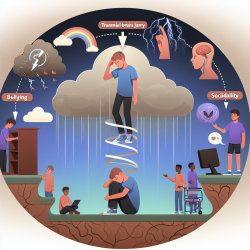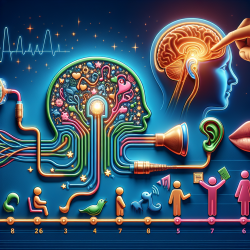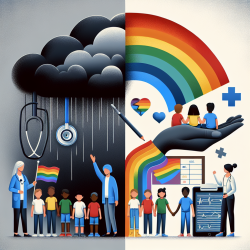Introduction
Traumatic Brain Injury (TBI) in adolescents is a critical public health concern, with far-reaching implications for mental health and behavior. The study "Suicidality, Bullying and Other Conduct and Mental Health Correlates of Traumatic Brain Injury in Adolescents" provides valuable insights into the prevalence and impact of TBI among youth. This blog explores the findings of this research and offers guidance for practitioners to enhance their skills in managing and preventing TBI-related issues.
Key Findings from the Research
The research, conducted using data from the Ontario Student Drug Use and Health Survey (OSDUHS), reveals that approximately 19.5% of adolescents have experienced a TBI in their lifetime. The study highlights several critical associations:
- Adolescents with TBI are significantly more likely to experience elevated psychological distress, with an adjusted odds ratio (AOR) of 1.52.
- There is a notable increase in suicidality among TBI-affected students, with an AOR of 3.39 for suicide attempts.
- These students are more likely to seek counseling through crisis help-lines and be prescribed medication for anxiety or depression.
- TBI is also associated with higher instances of bullying, both as victims and perpetrators, and increased engagement in violent and non-violent conduct behaviors.
Implications for Practitioners
Given the strong correlations between TBI and adverse mental health outcomes, practitioners must be proactive in screening and intervention. Here are some recommended actions:
- Vigilant Screening: Regularly screen adolescents for signs of TBI and related mental health issues, especially those who have experienced head injuries.
- Early Intervention: Implement early intervention strategies to address psychological distress and prevent the escalation of mental health problems.
- Comprehensive Support: Provide holistic support that includes counseling, medication management, and educational accommodations as needed.
- Collaboration: Work collaboratively with schools, families, and mental health professionals to create a supportive environment for affected adolescents.
Encouraging Further Research
While this study provides valuable insights, there is a need for further research to explore the causal relationships and long-term impacts of TBI on adolescent mental health. Practitioners are encouraged to engage in research initiatives and contribute to the growing body of knowledge in this field.
Conclusion
The associations between TBI and mental health challenges in adolescents underscore the importance of data-driven approaches in healthcare. By understanding these relationships, practitioners can better support young individuals in overcoming the challenges posed by TBI. For those interested in delving deeper into the research, the original study can be accessed here: Suicidality, Bullying and Other Conduct and Mental Health Correlates of Traumatic Brain Injury in Adolescents.










